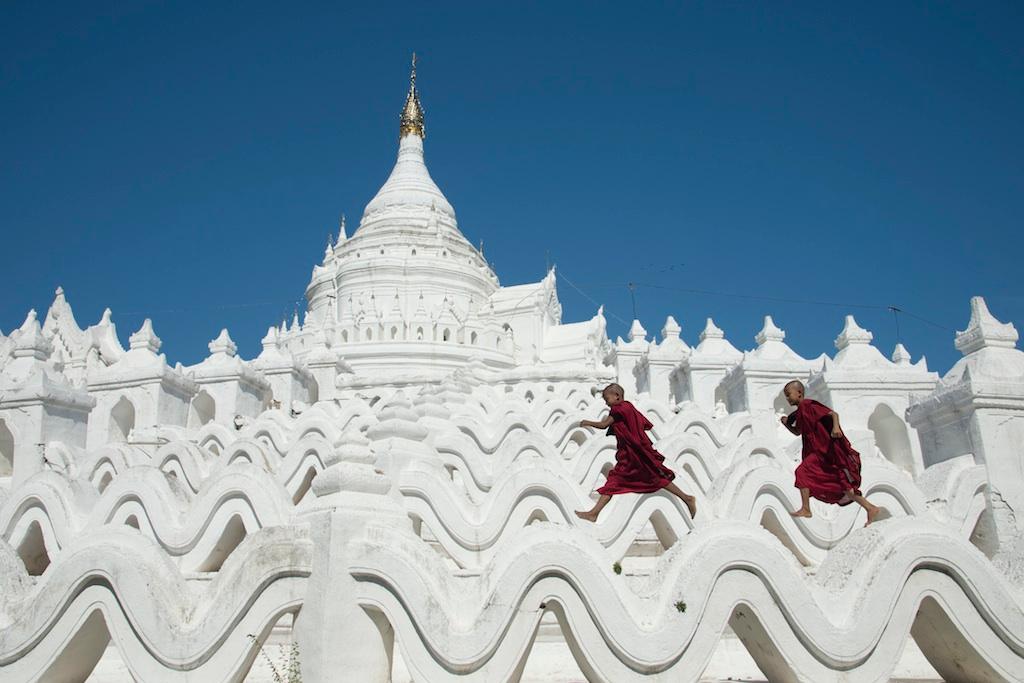Many Westerners pouring into Myanmar have no idea how offensive they are being
Two young Buddhist monks run through the Mya Thein Tan pagoda in Mingun on Nov. 28, 2013. Almost everyone in Myanmar is taught from childhood that Buddha’s image is sacred and that provoking monks is forbidden. They seldom break this societal pact. The same can’t be said for the Westerners now pouring into the country.
BANGKOK, Thailand — Few supreme beings are so casually blasphemed as the Buddha.
His face has been plastered on kitschy toilet seats sold on Amazon. And on port-a-potties in the Netherlands. Chic Italian designers sell chairs resembling his disembodied head, a sacred image that isn’t meant to be touched, let alone sat on.
It gets worse. Penthouse Magazine printed a spread in which a nude model pops her nipple in Buddha’s mouth.
Practically everyone knows that irreverent depictions of Islam’s Prophet Muhammed risk violent backlash. Vulgar depictions of Jesus Christ, while less apt these days to bring on bloodshed, at least register as obscene. Crude portrayals of either are typically created with provocation in mind.
But Buddhism, the fourth-largest religion on earth, is often disrespected in an offhand way.
In the West, Buddha’s face is lazily presented as a fetishized image indicating something vaguely exotic and serene. Stoners lean against Buddha pillows and get high. Buddha statues are used to decorate clubs packed with sweaty, wasted partygoers. College kids ink up their bodies with Buddha tattoos — a shocking act in the eyes of reverent Buddhists.
Blaspheming Buddha is unlikely to provoke the sort of murderous rampage suffered by Charlie Hebdo, the Parisian satire magazine that in recent years has made a point of insulting Muhammed. But in some Buddhist-majority states — namely Myanmar — it can get you deported or possibly thrown in prison.
That’s the fate of a New Zealander named Philip Blackwood. Until recently, the 32-year-old was managing a Western-style gastro bar in Myanmar, also known as Burma, a post-totalitarian state transforming into a hip holiday spot. He and two other Myanmar citizens who ran the bar have been imprisoned.
Their crime? In December, they allegedly disgraced the faith by promoting a drinks special using an image, posted to Facebook, of Buddha wearing headphones.
As a senior police official told local outlet The Irrawaddy: “He said he did it because using the Buddha in ads is in fashion internationally.” Blackwood faces multiple charges that could amount to a four-year prison sentence. His lawyer has reportedly received death threats just for taking on the case.
Blasphemy charges in Myanmar aren't common. Almost everyone in Myanmar is taught from childhood that Buddha's image is sacred and that provoking monks is forbidden. They seldom break this societal pact. The same can't be said for the Westerners now pouring into the country. Many have no clue that wearing skimpy clothes in a temple is as appalling as wearing a bikini in church.
Misusing Buddha’s image isn’t just insulting to the average Buddhist, says Buddhism scholar Paul Fuller of Britain’s Bath Spa University. It’s actually seen by many, he says, as “potentially dangerous.”
“Misuse of Buddha images is not simply unlucky,” Fuller says. Many Buddhists believe his image has “the power to avert danger and produce beneficial outcomes in this life and the next.”
To disgrace Buddha’s image — by, say, putting his face on a flier promoting margaritas — is to invite a run of bad luck. And Myanmar, a crumbling nation ravaged by war, needs all the luck it can get.
Thanks to its long spell of isolation, few in Myanmar know that well-meaning outsiders flippantly use Buddha’s image to sell booze and knick knacks. Authorities were also appalled last year when a Canadian tourist showed up with Buddha’s image tattooed on his right leg, a most unholy spot given its proximity to the feet.
He was promptly deported. A similar scandal played out in Buddhist-majority Sri Lanka, which deported a British tourist last year for turning up with a Buddha tattooed on her arm. Sri Lanka also has the distinction of banning R&B singer Akon for appearing in a music video titled “Sexy Bitch” in which bikini-clad women gyrate in front of a Buddha statue.
How would Buddha react to all this? According to Buddhist scripture, Fuller says, he wouldn’t have reacted at all.
As Fuller explained in an essay on Buddhist blasphemy: “Surely the Buddha, being free from all attachment, would not have taken any offense.”
Every day, reporters and producers at The World are hard at work bringing you human-centered news from across the globe. But we can’t do it without you. We need your support to ensure we can continue this work for another year.
Make a gift today, and you’ll help us unlock a matching gift of $67,000!
